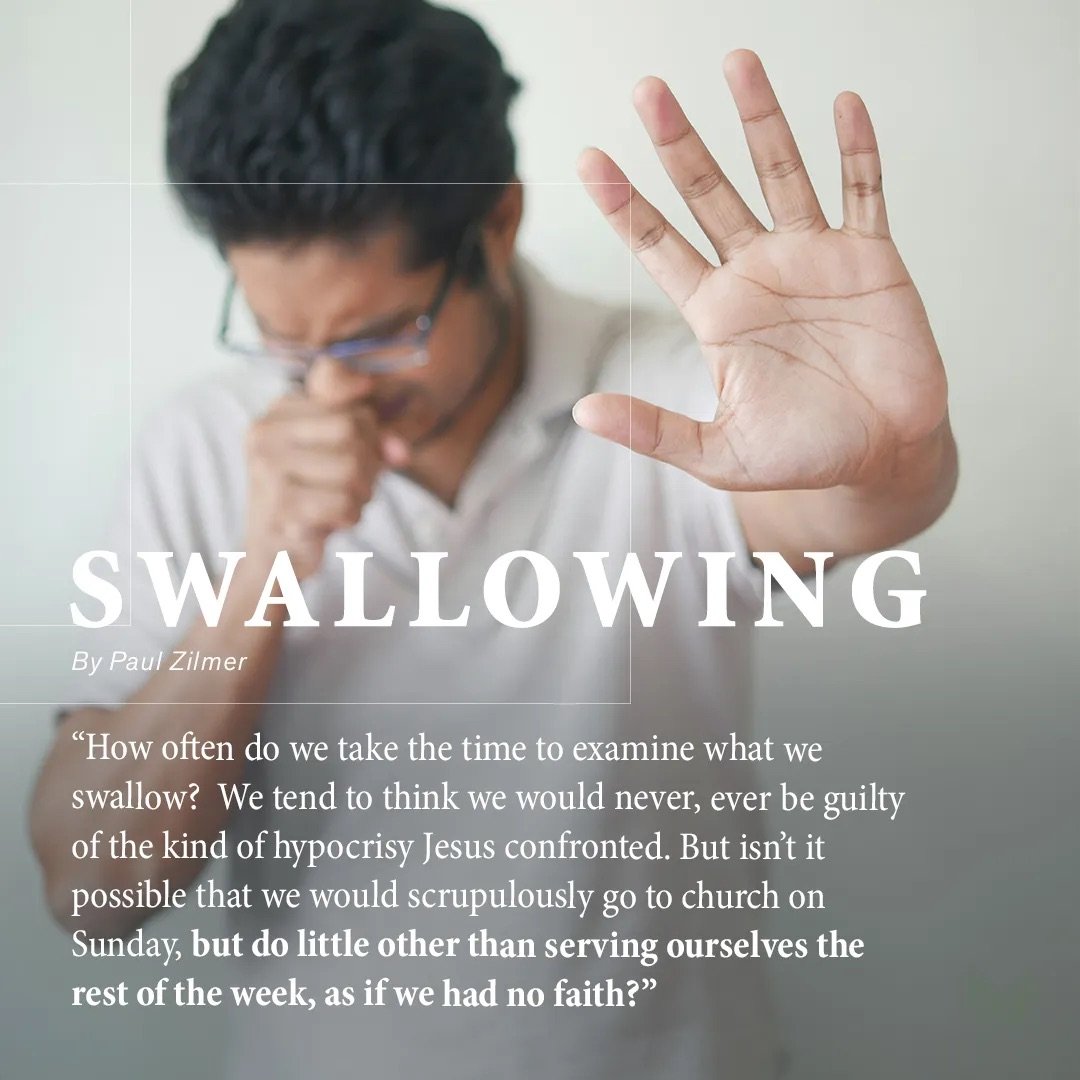Swallowing
You’ve read how blunt Jesus was in critiquing the religious leadership of his day. He pulled no punches. He particularly called them out for their hypocrisy. Twenty times, in fact! Here’s one of them:
“Woe to you, scribes and Pharisees, hypocrites! For you tithe mint and dill and cumin, and have neglected the weightier matters of the law: justice and mercy and faithfulness. These you ought to have done, without neglecting the others. You blind guides, straining out a gnat and swallowing a camel!” (Matthew 23:23-24)
The Law of Moses mandated that everyone give a tithe (one tenth) of every crop and every flock or herd of animals, to support the Levites who served in the Temple, and to support the poor. (Deuteronomy 26:11-14 & elsewhere)
The people Jesus addressed were scrupulous in keeping this law, to the extent of making sure a tenth of their little spice garden was given. But the indictment Jesus laid against them was that, while keeping the minutia of the Law, they totally ignored the truly important things: being just, being merciful, being faithful.
I guess it was because you can measure a tenth of the mint leaves you grow, but how do you measure justice or mercy? Since these couldn’t be measured, they were simply ignored. And that, Jesus said, was cause for woe being pronounced on them.
Under the Law, God’s people were not to consume any unclean animal. With few exceptions, all insects were unclean. (Leviticus 11:20-24) Just touching a dead insect made you unclean. The Pharisees Jesus confronted were once again scrupulous to keep the Law, by straining a beverage if a gnat happened to land in it, so they wouldn’t swallow or even touch the tiny but unclean animal.
“But,” Jesus accused them, “you have no problem swallowing a camel!”
A camel would be the largest unclean animal they would likely ever see. You’ve seen pictures—they are massive! The utter impossibility of swallowing one shows us that Jesus is using hyperbole, which he does often in his parables. So we understand this to be a parable.
He had already laid out one “gnat”—the spice garden, and one “camel”—ignoring the most important commands in the Law. He left it there, but there was a much more important instance yet to come.
Judas agreed to betray Jesus to his enemies, in exchange for 30 silver coins. Later he changed his mind and tried to give the money back. The leaders who had hired him refused it, and Judas threw the coins into the Temple. Then:
But the chief priests, taking the pieces of silver, said, “It is not lawful to put them into the treasury, since it is blood money.” So they took counsel and bought with them the potter's field as a burial place for strangers. (Matthew 27:6-7)
This is astounding, when you think of it. Scrupulously adhering to the law forbidding money gained by prostitution to be accepted (Deuteronomy 23:18), which they had broadened to include any evil source. They strained out that gnat all right. But they actually acknowledge, admit, that it is blood money. Money they paid so that they could do murder. I don’t think there is any camel more impossible to swallow, but they did it.
How often do we take the time to examine what we swallow? We tend to think we would never, ever be guilty of the kind of hypocrisy Jesus confronted. But isn’t it possible that we would scrupulously go to church on Sunday, but do little other than serving ourselves the rest of the week, as if we had no faith? Scrupulously read our Bible regularly, but unjustly malign someone in gossip? Scrupulously serve on committees to minister to needy people, but hold a grudge for years toward someone who mistreated us?
Oh yes, those weightier matters: justice, mercy, faithfulness. It is good and right, Jesus said, to be scrupulous not to swallow the gnats. But he’s really concerned that we aren’t even noticing the camels in our diet.
Love, Paul


